Lynn Nottage Talks Research, Collaboration, and the Fracturing of America
Lynn Nottage’s newest play, Sweat, a co-commission by Oregon Shakespeare Festival (OSF) and Arena Stage, originated in OSF’s American Revolutions: The United States History Cycle. Nottage’s contribution to this ten-year program of commissioning “up to thirty-seven new plays from moments of change in United States history” deals with the moment of change that we are in right now, a moment she calls the “de-industrial revolution, the bookend to a century that began with the shaping of America through the Industrial Revolution.”
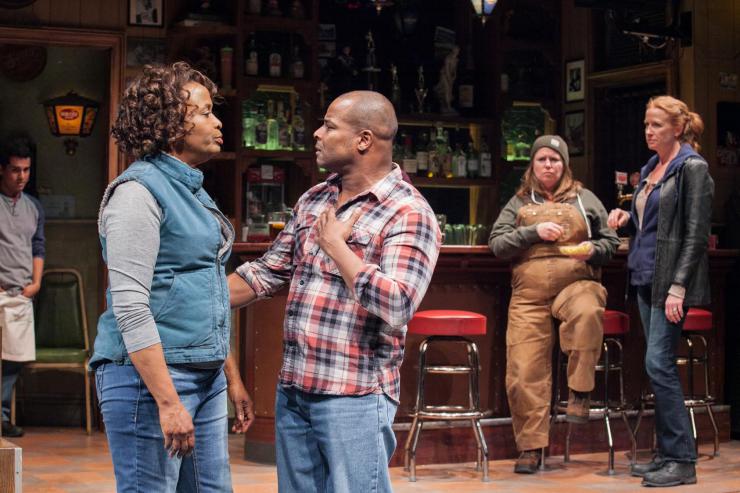
Nottage had been struck by a 2011 New York Times article about the impact of the Great Recession on the town of Reading, Pennsylvania, and, along with director Kate Whoriskey, decided to approach this project the same way they approached Ruined, Nottage’s Pulitzer-Prize winning play about Congolese women living in a war zone: by immersing themselves in a place and getting to know the people who live there.
Speaking by phone from New York, Nottage shared her love of that process:
There is something lovely about the playwright and the director going through the same process, having the same reference. I know that the experience we had in Uganda is that we made these lists. She’d write down everything she was experiencing and I’d write down everything that I’d experienced and what we found is that a lot of time our eyes pick up and see different things, which I think complement each other and fill out the experience. So when I reached out to Kate it was with that same concept in mind: that we go and do the research together, sharing the same experience but writing it down and then comparing our lists. For me it was kind of eye opening. For so many directors, theatre is a visual medium and for so many playwrights it’s a literary medium. So she would describe textures and colors whereas I would tend to describe the nature of the encounter.
What they found in Reading was a town in which the economic contraction that began in 2008 and has nearly disappeared the middle class in the ensuing years is realized literally in the architecture. Whereas Reading used to be the site of a thriving shopping economy, now “the outlet malls are all closed and you see the shells, these hollowed out buildings that still have the Kenneth Cole logo painted on them but there’s nothing inside.”
For so many directors, theatre is a visual medium and for so many playwrights it’s a literary medium. So she would describe textures and colors whereas I would tend to describe the nature of the encounter.
The story of Sweat centers on two young men who work in a factory with other members of their family, as they have for generations. Over the course of the play, which spans one year, the factory slowly decides to push them out, which frays and deteriorates those long-term relationships with not-so-happy consequences. In their visits to Reading, Nottage and Whoriskey found that,
When things became fractured, they became fractured along economic lines but also racial lines. What we experienced was that everyone is sort of pointing over the divide at everyone else and placing blame. So instead of placing the blame on those who are really responsible, the greedy corporate interests, we tend to cannibalize each other. We say “it’s your fault, person of color, for coming in and taking our jobs” rather than really examining what’s happening on a larger and broader scale, which is that the companies are making decisions to move the factories to a right-to-work state, or out of the country so that they can exploit workers in different ways.
Wary of pillaging Reading for their stories and leaving, Nottage is now working with the Labyrinth Theater Company on an installation project that aims to create a space that puts people in Reading in conversation with one another, allows them to tell each other their stories, and hopefully shows them what Nottage saw, which was that despite their differences, they actually share one fundamental narrative. Labyrinth and Oregon Shakespeare Festival will also co-produce a reading of Sweat in Reading this spring.
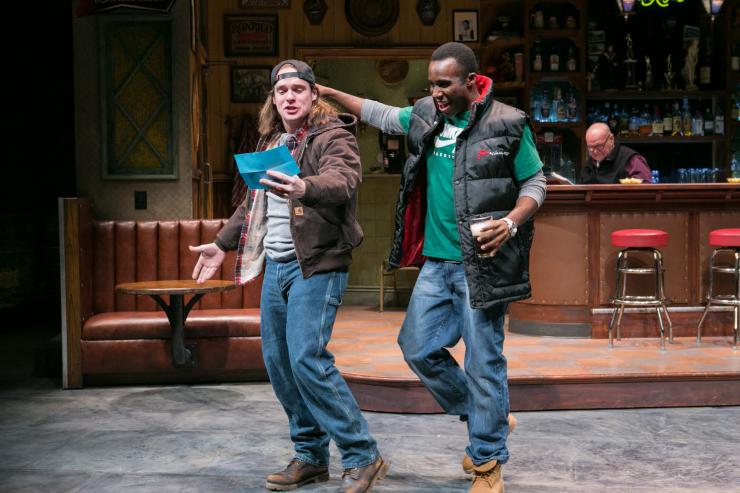
Asked whether she’s concerned that the upper-middle-class audiences that frequent large theatres in metropolitan areas might not be able to connect with her working-class characters, Nottage was optimistic: “There’s a fear that upper-class audience members can’t see themselves in the characters, but I think that that’s not true of everyone who goes to the theater.” She continued:
One of my frustrations with what happens on the stage a lot of the time when working class people are put up there, it’s like poverty porn. They’re laughed at, or they’re the villains, or they’re ridiculous. I think the struggles folks are going through are really real. It affects you physically and emotionally. And I think about America where you have the majority of people living in that state and we’re seeing what it’s doing to us in the level of gun violence and the level of sexual abuse and assault that happens around the country. I think it’s a result of the stress that we’re under to survive.
Despite the underlying economic and social critique and the painstaking research that went into creating the play, the people it renders are familiar, and the audience encounters these people in a very familiar place—one that has served as an apt home for classics from Eugene O’Neill and William Saroyan to John Patrick Shanley —a bar.
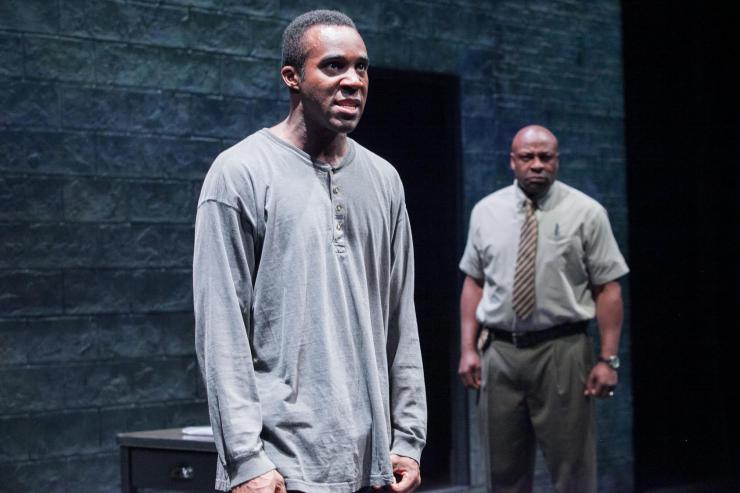
I think that provocation is when you enter in the space and everything you believe in is challenged.
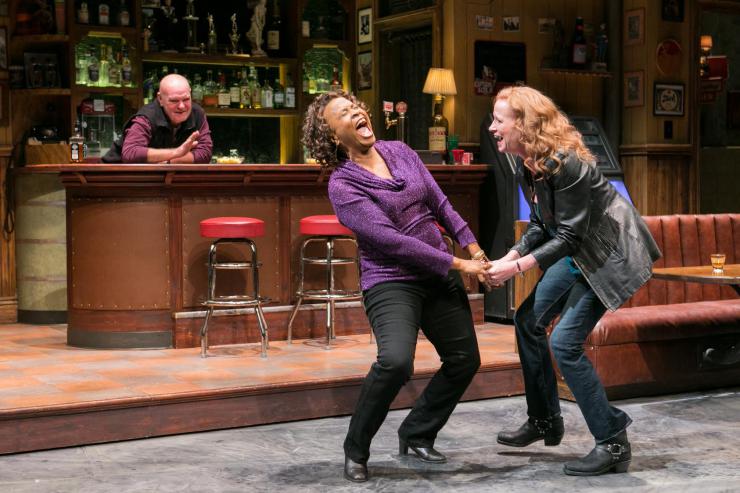
Nottage chose the setting in order to write the kinds of conversations people have in neutral, relaxed spaces like bars, and she based her bar on one of many that she and Whoriskey visited in Reading:
There was one that we walked into where the architecture definitely affected the design impulses: You could see it was filled with history and knick-knacks and little things that told the story and told you how much the space was kind of beloved.
Nevertheless, I wouldn’t bet on the relatable characters and familiar setting keeping the play from hitting a few nerves, but that’s part of Nottage’s goal:
What I see in New York is that the shows are shrinking down. I don’t see a lot of politics on stage. And I think that when work is confrontational the confrontation is about people taking off their clothes, it’s not about ideas and ideologies being challenged. It’s interesting what people think provocation is. I think that provocation is when you enter in the space and everything you believe in is challenged.
I think that what surprises people with this show is the alliances that they forge with characters that are then undermined. I think that that’s what people respond to—that the whole show exists in the gray area. Everyone in the play makes a compromised decision that ends up having implications that hurt someone else. There’s no character in the play that doesn’t do that, and I think that’s challenging.


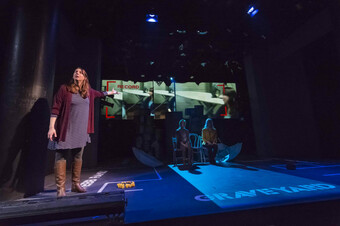

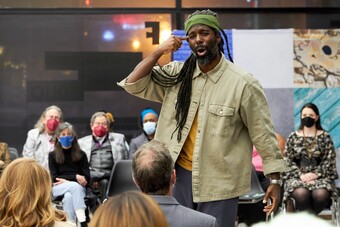








Comments
The article is just the start of the conversation—we want to know what you think about this subject, too! HowlRound is a space for knowledge-sharing, and we welcome spirited, thoughtful, and on-topic dialogue. Find our full comments policy here